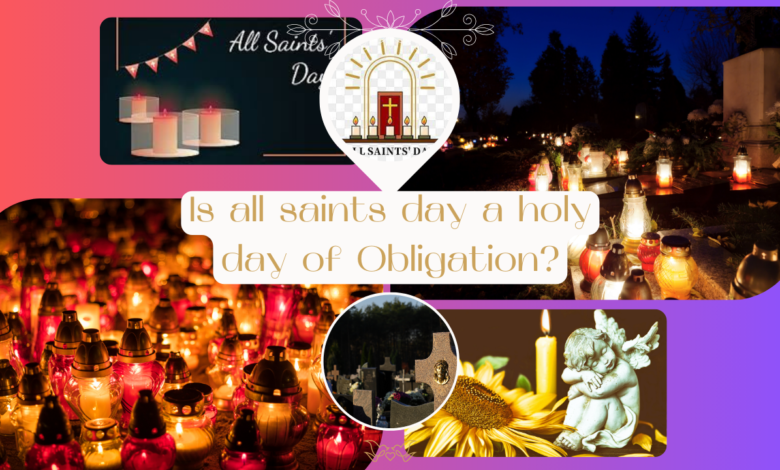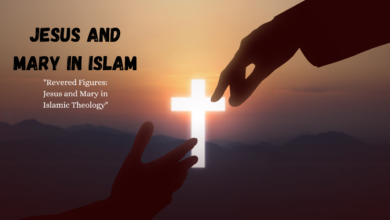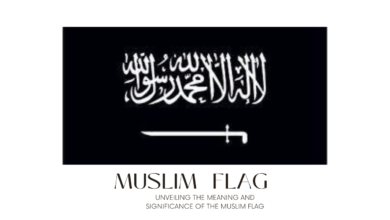Is all saints day a holy day of Obligation?
"Understanding All Saints' Day: Holy Day of Obligation?"

Is all saints day a holy day of Obligation?
All Saints’ Day is a Christian holiday dedicated to honoring all the saints, known and unknown, who have attained heaven. It is a day to celebrate and remember their exemplary lives and devotion to God.
Introduction
All Saints’ Day, celebrated on November 1st each year, is a significant feast day in the liturgical calendar of the Catholic Church. It is a day set aside to honor and commemorate all the saints, known and unknown, who have lived holy lives and are now believed to be in the presence of God. However, the question arises: Is All Saints’ Day a holy day of obligation for Catholics? In this article, we will explore the concept of holy days of obligation, the history and significance of All Saints’ Day, and whether or not Catholics are required to attend Mass on this day.
Understanding Holy Days of Obligation
Holy days of obligation are specific days in the Catholic liturgical calendar when the faithful are required to attend Mass and abstain from certain types of work. These days are considered essential in the life of the Church and hold a special place in the religious observance of Catholics. In the United States, there are six holy days of obligation recognized by the United States Conference of Catholic Bishops (USCCB), including Christmas, Mary, Mother of God, the Assumption of the Blessed Virgin Mary, the Immaculate Conception, the Feast of All Saints, and the Solemnity of the Ascension.
Also Check
- The Islamic Calendar: Dates and Holidays
- Is Music Forbidden In Islam?
- What does all hallows eve mean?
- Where did Christianity start?
- Why is music Haram in Islam?
- Islamic picture
All Saints’ Day: History and Significance
All Saints’ Day, also known as “Solemnity of All Saints,” has its origins in the early Christian Church. The practice of commemorating martyrs and other holy individuals can be traced back to the earliest days of Christianity. However, it wasn’t until the 4th century that a specific day was established to honor all saints collectively. Pope Boniface IV consecrated the Pantheon in Rome as a church on May 13, 609 AD, dedicating it to the Virgin Mary and all martyrs. Later, Pope Gregory III expanded the celebration to include all saints and moved it to November 1st in the 8th century.
The primary significance of All Saints’ Day is to remember and venerate all those who have lived exemplary lives in their faith and devotion to God. It is a day to celebrate the communion of saints, both those recognized by the Church and those whose names are known only to God. It reminds Catholics of the ultimate goal of their faith: to become saints and to join the company of the blessed in heaven.
Is All Saints’ Day a Holy Day of Obligation?
The status of All Saints’ Day as a holy day of obligation varies from country to country. In the United States, it is considered a holy day of obligation, meaning that Catholics are required to attend Mass on this day, just as they would on Sundays. However, the obligation is often dispensed if All Saints’ Day falls on a Saturday or Monday, and the celebration is moved to the nearest Sunday. This is done to accommodate the schedules of the faithful and ensure that they have the opportunity to fulfill their religious duties.
In some other countries, such as the United Kingdom and Canada, All Saints’ Day is not considered a holy day of obligation. Catholics are encouraged to attend Mass and participate in the celebration, but they are not obligated to do so.
Conclusion
All Saints’ Day holds a special place in the Catholic calendar as a day to honor all the saints, known and unknown, who have lived holy lives. In the United States, it is considered a holy day of obligation, requiring Catholics to attend Mass, unless it falls on a Saturday or Monday when the obligation is dispensed. The observance of All Saints’ Day serves as a reminder of the importance of the communion of saints and the ultimate goal of striving for holiness in one’s own life. Regardless of whether it is a holy day of obligation in a particular country, it remains a meaningful and spiritually significant day in the Catholic tradition.
(FAQs) about All Saints’ Day and whether it is a holy day of obligation:
What is All Saints’ Day?
All Saints’ Day is a Christian holiday dedicated to honoring all the saints, known and unknown, who have attained heaven. It is a day to celebrate and remember their exemplary lives and devotion to God.
Is All Saints’ Day a holy day of obligation in the Catholic Church?
Yes, All Saints’ Day is a holy day of obligation in the Catholic Church. It is one of the six holy days of obligation in the Church’s calendar when Catholics are required to attend Mass and refrain from unnecessary work.
When is All Saints’ Day celebrated?
All Saints’ Day is celebrated on November 1st each year in the Roman Catholic Church. In some countries, it may be transferred to the nearest Sunday if it does not fall on a Sunday.
What is the significance of All Saints’ Day?
All Saints’ Day serves as a time for Catholics to honor and seek the intercession of all the saints in heaven. It reminds believers of the ultimate goal of their faith: to attain heaven and be with God for all eternity.
Are there any exceptions to the obligation to attend Mass on All Saints’ Day?
Some circumstances may excuse individuals from the obligation to attend Mass, such as illness, caring for the sick, or other serious reasons. However, Catholics are encouraged to make an effort to participate in Mass on this holy day.
Is All Saints’ Day a holy day of obligation in other Christian denominations?
All Saints’ Day is primarily a Catholic observance, and its status as a holy day of obligation may vary in other Christian denominations. Anglican, Orthodox, and some other Christian traditions also commemorate All Saints’ Day but may not have the same obligation to attend Mass.
How is All Saints’ Day typically celebrated?
Catholics often attend Mass, and some may visit cemeteries to pray for and remember their deceased loved ones. It is also a day when saints’ stories and contributions to the faith are highlighted in sermons and teachings.
What is the connection between All Saints’ Day and All Souls’ Day?
All Saints’ Day and All Souls’ Day (November 2nd) are related but distinct observances. All Saints’ Day celebrates all the saints in heaven, while All Souls’ Day is dedicated to praying for all the faithful departed who may still be in purgatory.
Can non-Catholics or non-Christians participate in All Saints’ Day observances?
While All Saints’ Day is primarily a Catholic observance, people from various faith backgrounds are welcome to attend Mass or participate in respectful ways to learn about and appreciate the significance of the day.
Is All Saints’ Day a public holiday in some countries?
All Saints’ Day is a public holiday in some predominantly Catholic countries, such as Italy, Spain, and Poland. In these places, businesses and schools may be closed on this day to allow people to participate in religious observances.






